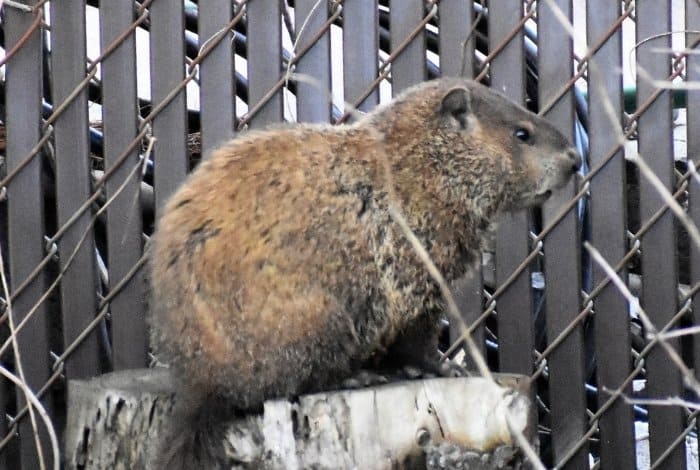Last Updated on January 31, 2023 by Griselda M.
I was also quite adamant about finding the answers to the question, will vinegar get rid of groundhogs, so I decided to try it out myself. If you live in the United States, it is important to learn how to get rid of groundhogs for good by natural means, as it is a much safer way to go about it. Groundhogs are classified as rodents and are the largest member of the squirrel family.
Homeowners and farmers face the problem of groundhogs invading their yard space which is quite annoying. They not only destroy plants and crops but also make their home on your property, rent-free! The cheek of these unwanted invaders needs to come to a halt, and the best ways to stop their invasions are listed below.
So What Exactly Are Groundhogs and Where Do They Live?
Groundhogs are also referred to as whistle pigs or woodchucks. They are a part of the six species of woodchucks and marmots that live in the United States. They invade vegetable gardens and cropland, destroying and eating vegetables and other landscape plants that they favor.
General Habits of the Groundhogs
- They make their homes in fields, along fences, near building foundations, or at tree bases. They usually leave mounds of soil at the sites they dig in.
- These creatures are also slow runners, and they hurry into their dens when they sense any danger.
- Their primary predators are foxes, hawks, bobcats, coyotes, humans, and dogs.
- They are primarily active during the day and feed early in the morning.
- They are strict herbivores. They eat a variety of vegetables that include beans, carrot tops, peas, soybeans, alfalfa, and grass.
- Groundhogs also love sunbathing when the weather is warm.
- They enter hibernation when winter is about to start. There is a celebration day in the UK called Groundhog Day when they emerge from their hiding places. This day is observed because it is an indicator of whether the townsfolk can look forward to an expectant early spring or endure another six weeks of winter.
What Smells Do Groundhogs Hate
If you’re wondering what smell groundhogs hate, then listen up. I am aware of what a nuisance groundhogs can become as they are inclined to destroy crops and garden plants, amongst other disasters. Pungent smells, which include lavender, oregano, thyme, sage, rosemary, lemon balm, mint, basil, and chives, are amongst the most notable odors that steer these invaders away.
If you were to plant lavender or any of the above-mentioned plants in your garden, the scarcity of groundhogs would become evident. This is because they find the odors emitted by these plants quite offensive, to say the least. Other ways to irritate the noses of these creatures would be to use groundhog repellent. You can opt for ready-to-use concoctions or repellers that are widely available or you could use a good old-fashioned sprinkle of vinegar to rid them off.
For the smell to stuff up their noses, ensure that you sprinkle the vinegar at the entrance of the groundhog burrow for effective results. If the use of natural products appeals to you, then aside from vinegar, Epsom salts would also steer them away. Sprinkling it around the perimeter of your yard or garden would be beneficial. These natural products will not cause the groundhogs any harm. Using them will only drive the groundhogs away from your home.
How to Keep Groundhogs Away
Knowing how to keep groundhogs away from your yard and garden will be beneficial to you and your plants. Groundhogs are attracted to vegetables and flowering plants as they love consuming them. Amongst the plants that keep groundhogs burrowed in your yard, soybeans, plantain, alfalfa, broccoli, clover, peas, lettuce, and beans are their favorites.
If you already have groundhogs living in your yard when you start planting, then your seedlings stand little to no chance of developing into full-grown plants. This is because these nuisances will eat them before they start to grow. Additionally, even if your garden is bare of vegetable plants, groundhogs will still sit around to devour twigs, blossoms, and bugs that they find in the yard. That is why you should take heed of these tips to keep groundhogs out of your yard.
Tips to keep groundhogs away:
- The use of hair clippings, talcum powder, blood meal, and ground black pepper sprinkled around the garden works great.
- A concoction of hot peppers and garlic that has been pureed and mixed with water and liquid soap is another excellent option to steer groundhogs from your yard.
- Adding vinegar to the inside of the groundhog burrows will prove effective in keeping them at bay.
- The removal of groundhog nests which include woodpiles should be removed to unsettle them.
- It is best to keep grass cover and undergrowth short as it will deter groundhogs.
- Sealing off vacant burrows will avoid ned groundhog infestations.
Will Ammonia Get Rid of Groundhogs
So, will ammonia get rid of groundhogs? Yes, ammonia will get rid of them. When it comes to groundhogs, making use of cloudy ammonia or sudsy ammonia is best as it works effectively. You can opt to buy the readymade repellent solution from the store or make your own concoction at home if you prefer.
If you go with the homemade ammonia solution, then all you would need to do is to add a quarter cup of water to two tablespoons of any detergent that you have available in your home. Thereafter, mix the above solution with two full cups of ammonia and stir it. The stench of this substance is not very welcomed by groundhogs so they prefer to stay away from it. That is why this mixture should be poured directly into the groundhog burrows to ensure that they vacate your yard.
Don’t be stingy with this application, as the more solution your pour in, the more favorable the results. This process is not an overnight miracle to get rid of groundhogs. Consistent daily applications are required to get rid of the entire lot that has set up a house in your garden. You could also opt to soak pieces of cloth in the ammonia mixture and position them around your yard. However, this should be done with extra caution, especially if you have pets or little children that may be exposed to ammonia-soaked rags.
Other Effective Ways How to Get Rid of Groundhogs
As mentioned above, groundhogs are considered a nuisance because they cause extensive damage to farms, homes, and crop fields from their feeding and burrowing habits. As they burrow they destroy building foundations, cause electrical outages from gnawing at underground wires, and create untidy lawns.
Though they do not come into direct contact with humans, they can carry fleas, ticks, and rabies in the rare case that they bite. Here are a few additional methods that you can implement to clear your yard of groundhogs.
Natural Methods To Get Rid of Groundhogs
1. Fencing
A fence is one of the easiest natural ways to keep groundhogs from burrowing in your yard. You can use a wood or metal fence with extra specifications that prevent groundhogs from scaling it or digging underneath. These extra specifications include the following:
- Digging the fence deep into the ground, at least 2 feet under.
- Leave no openings between slats of wood or metal wirings.
- Keep the fence straight from the ground up.
Learn more about the Best way to repel rabbits
2. Sanitize Your Yard
Groundhogs visit your garden once they smell vegetation, especially ripe fruits. Pick ripe vegetables and fruits as soon as they are ready, and rake up any pieces that have dropped or begun to rot. Also, clear your yard of any food particles that may be lying around. Seal off your trash cans to stop them from releasing any odors.
3. Use Offensive Smells
As mentioned above, there are certain smells that groundhogs detest. Use these offensive odors to keep them away. Some of these detestable smells that have proven most effective include:
- Lavender – Plant them around the garden because they are offensive to the groundhogs.
- Cayenne pepper – Simply pour cayenne pepper close to the groundhog’s house
- Garlic – Crush some and spread the paste around the areas of the garden that you want the groundhogs to avoid.
- Vinegar – The pungent smell of vinegar drastically affects groundhogs so they hate it.
4. Use Sonic Groundhog Repellent
XMSTORE Solar Sonic Groundhog Repeller
Conclusion
Will vinegar get rid of groundhogs was the pressing question that we have answered in this article? We hope that you use these tried and tested methods to clear your yard of these rodents. Remember, that a little patience and natural ways go the distance in keeping groundhogs away from your yard, or until the wildlife agency picks them up. Consistent applications of the mentioned homemade repellents will eventually afford you a yard free of groundhogs.
FAQs
How do you get rid of groundhogs fast?
The first step to getting rid of groundhogs is to identify where they are. You can check under your house, in the attic, or in the garden. Once you find them, you need to get your hands on a shovel and remove their bodies.
The best way to get rid of groundhogs is by using a DIY method that involves putting chicken wire around the perimeter of your yard and then pouring boiling water onto it. Another way would be by using a sticky substance called Sticky Paws and then covering it up with mulch or topsoil.
What is the best groundhog repellent?
The best way to do this would be by using an organic formula or herbicide to block off their access. One example of this is Liquid Fence which can be used in conjunction with other natural ingredients such
What smells do groundhogs hate?
Groundhogs hate pungent smells, such as rotten eggs and skunk.
Will vinegar deter groundhogs?
Vinegar is thought to deter groundhogs from coming into contact with humans or property by giving off a repulsive scent.
Caroline is a gardener who loves to get down to the nitty–gritty of gardening. She proudly proclaims herself as a ‘dirt worshipper‘ and can often be found deep in the garden, covered in soil and singing to her plants. As a self–proclaimed ‘plant whisperer‘, Caroline believes that plants need love and attention just like any other living thing, and she loves to give them both. When she‘s not tending to her garden, you can often find her researching the latest gardening trends, or teaching others how to make their gardens thrive




